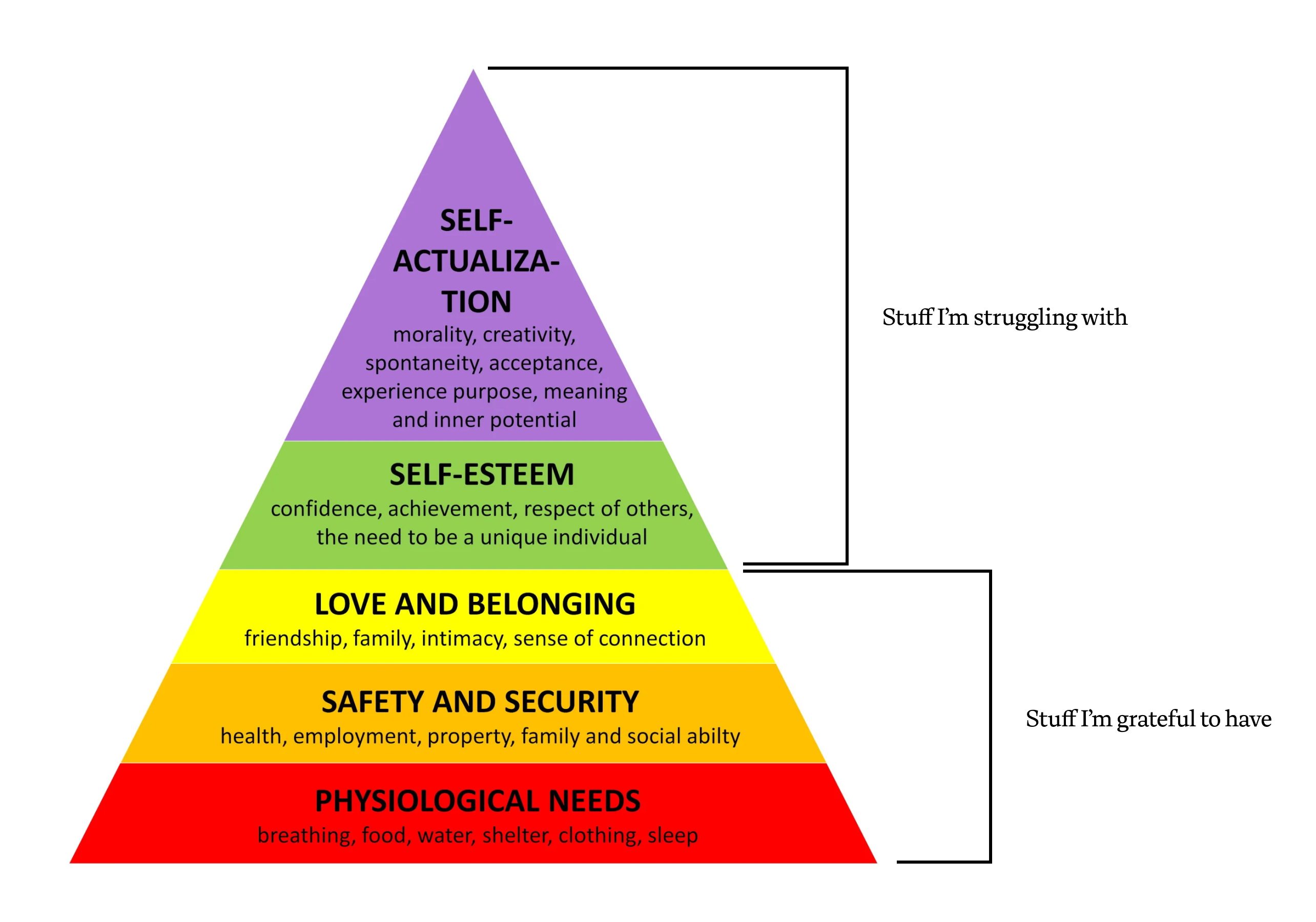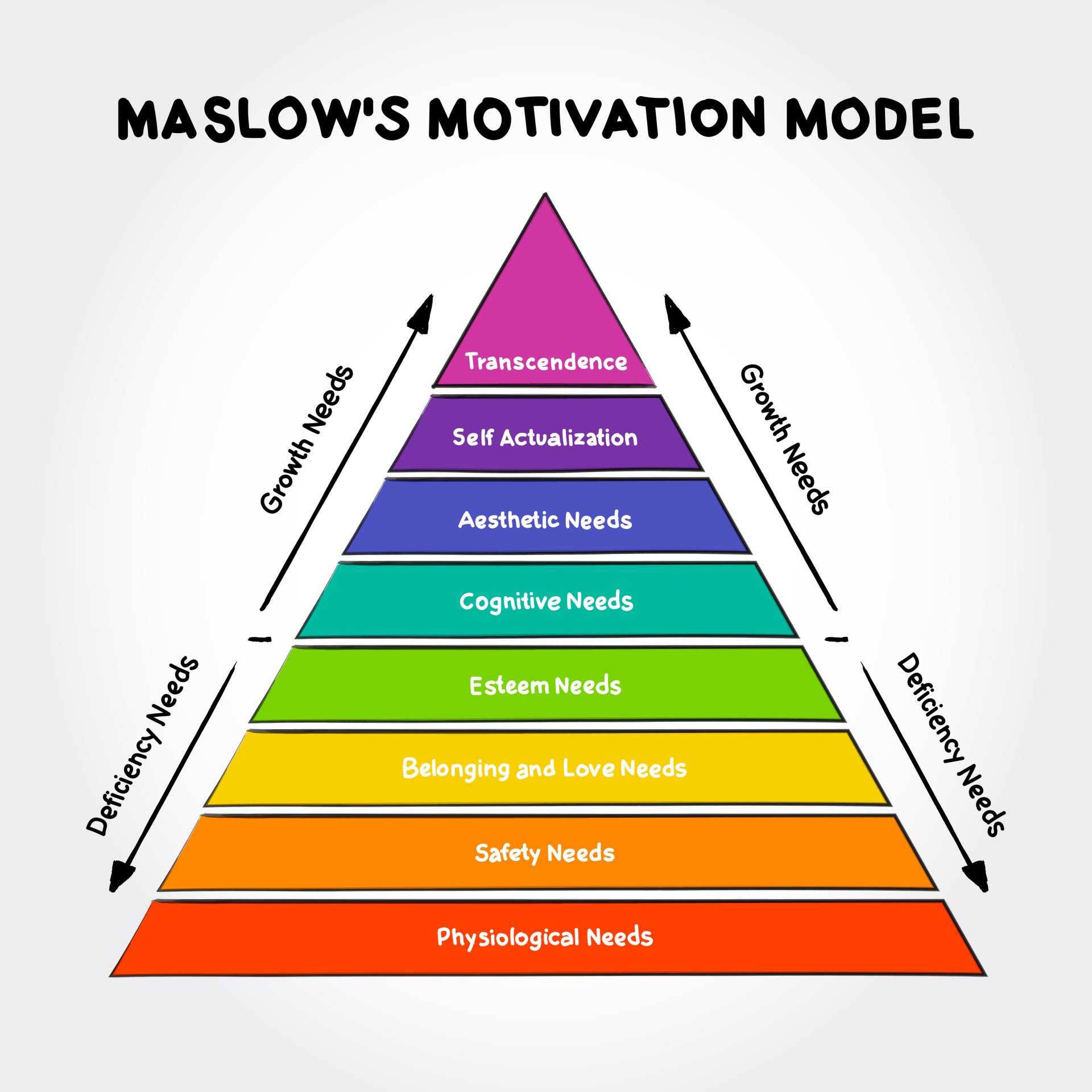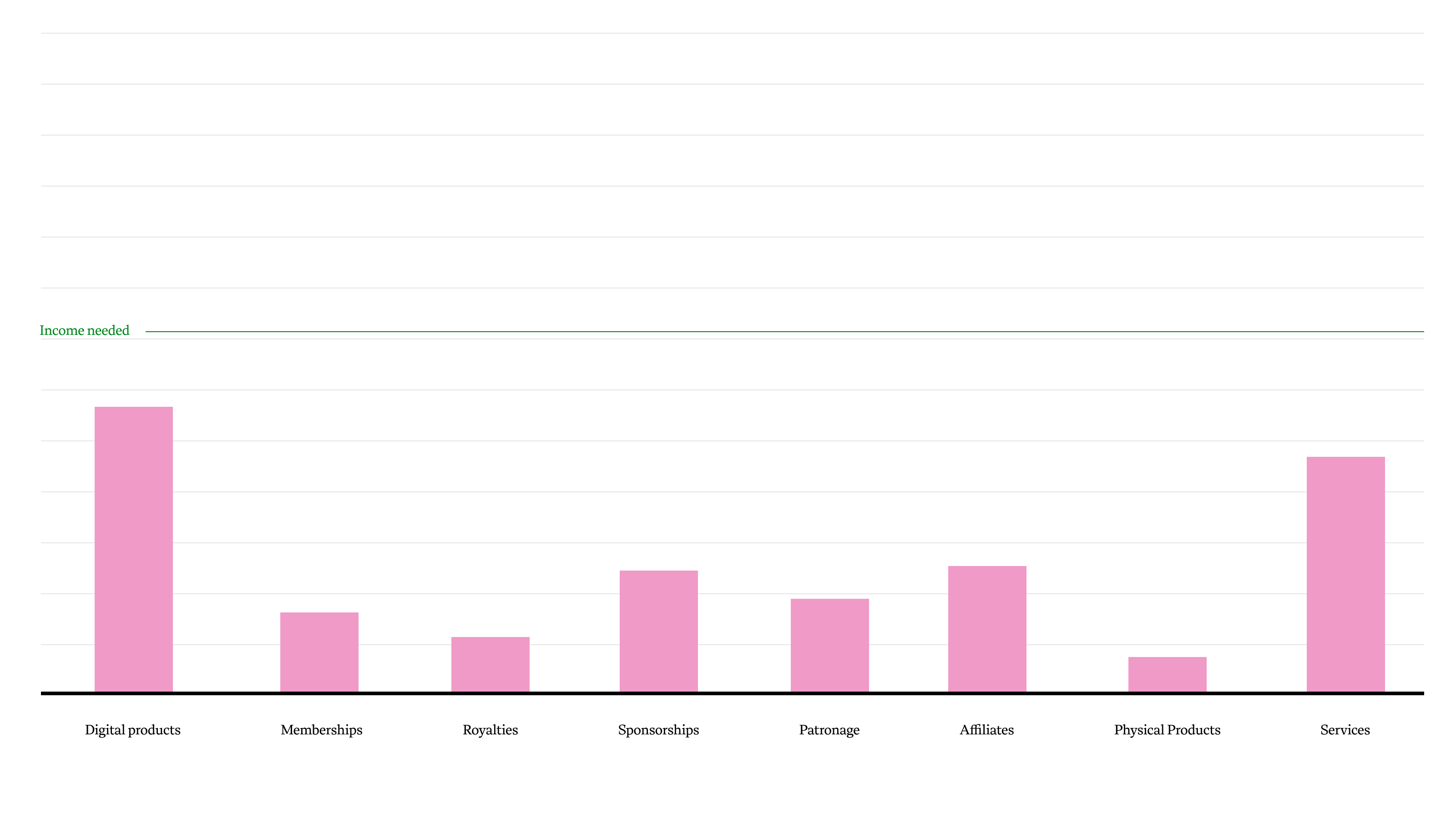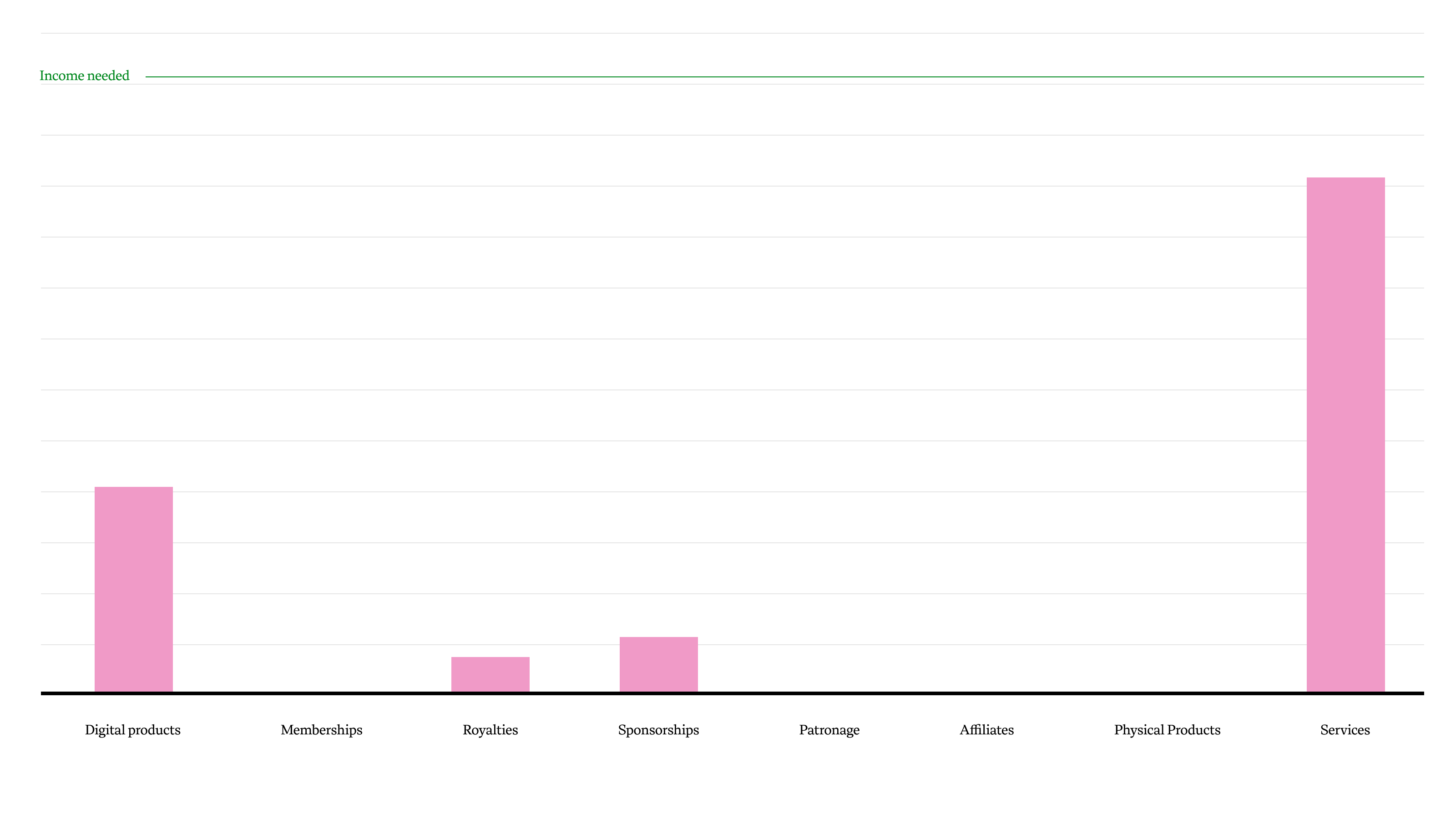“Looks like you’re killing it.”
“Someday I want to be where you are in your career.”
“You seem so grounded and focused about pursuing what you want.”
“It seems like this new phase of your career is going well.”
These are just a few messages I’ve received lately from some of my friends and social media followers.
I’m incredibly flattered by these messages. It feels good to be recognized.
I also feel wholly delusional about it, as what people seem to be seeing about me doesn’t match the way I feel about what I’ve been doing lately. I seem to have done what I abhor: sharing only the Instagram version of my life and career and obfuscating the bumps.
Honestly, I’m struggling.
Of course, I’d like to qualify “struggles” here. Maslow’s Hierarchy of Needs gives me some helpful concepts and language.

I’m lucky and grateful that I’ve almost never had to struggle with getting physiological, safety and security, and love and belonging needs in my life. I’m struggling with self-esteem and self-actualization needs, which is a privilege and a problem.

I recently came across this framing, which gives me even more helpful language. I’m experience growth needs, not deficiency needs. Here’s how Maslow distinguished growth needs:
[Growth needs] don't stem from a lack of something, but rather from a desire to grow as a person.
Yes! I feel seen. I’m thankfully not lacking anything, but I feel stuck on how I can be growing right now. I don’t know if I fully believe this, but I can’t stop thinking about the William S. Burroughs quote: “When you stop growing, you start dying.”
I’m not sharing this to denigrate myself or garner any pity. I’m sharing for 3 reasons:
- To find others that might be feeling similarly. Sure, misery loves company, but so does community.
- To document it for myself so I don’t forget this part of the journey.
- So that you might learn from my experiences and maybe avoid the struggles I’m having before they arise for you.
Oh, and to put a fine point on it, I’m fully aware that I am smack dab in the middle of my mid-life crisis. Mid-life crises are often brought on by a trigger event. In the last few years: I shut down my business of 10 years, had some significant family events, turned 40, and experienced a global pandemic with the rest of the world. I think those qualify as ample trigger events.
Even though I’m aware of this, I know I can’t do anything to stop it. I’m accepting going through it and identifying what’s both in and out of my control. Here are some things I wish I could control that I’m working on accepting instead.
Money
A lot of my current struggles have something to do with money. This comes in different forms, from different angles.
Overall, I don’t have as much money as I used to or that I’m used to. A lot of feelings comes with that.
I made way more than a comfortable salary when I was running SuperFriendly, and that doesn’t even include the perks that came with running my own company in terms of the things a company can pay for on behalf of its owner.
A few years ago, my wife and I bought our dream house. It was way more than I ever thought I would or could spend on a house, but we could afford it. A few years later, the combination of: lower salary in starting a new business; the tech industry—generally, my main customer base—landscape changing drastically due to massive widespread layoffs; economic impact of a global pandemic; and a variable interest rate on our mortgage kicking in has drastically changed my financial picture. It’s stunning what a doozy the 1-2 punch of less income + higher expenses can be.
I was blindsided by a higher tax bill this year than I anticipated or than I can afford to pay outright, so I have an installment plan with the IRS to pay it back. I feel really embarrassed about this for a few reasons.
First, I’m supposed to be An Experienced Business Owner™ at this point. Taxes aren’t supposed to be a thing that surprises me anymore.
Secondly, when I first started freelancing 20 years ago, I didn’t know about paying self-employment taxes. I owed a giant amount that took me 7 years to pay off. Even though my current taxes bill is much smaller so I can pay it off much more quickly, this does feel like a regression. I can justify it in the fact that I had a CFO at SuperFriendly so I didn’t have to pay attention to this myself in a way that I have to do now, but I still feel shame from it.
The third reason I feel embarrassed about it is that, for years, my personal brand has partially been about transparency around money. I even wrote a freakin’ book about it! The truth is I’ve always been good at making money, which is what I wanted to share about in my book. But I’ve never been good at saving or managing money, which is why the book isn’t really about those topics. I’ve gotten better at those parts over the years through learning more about them and having help, but it comes much less naturally for me. Making a lot of money conveniently obscures the lack of discipline in saving and managing it, but that deficiency comes back with a vengeance when margins get thinner.
Work and time
One of the reasons I stopped running an agency is that I wanted to explore different ways of making a living than directly selling my time. That’s the appeal of selling products, which is the gateway into the emerging and growing idea of the creator economy. Most creators pursue a portfolio approach—or, as ConvertKit CEO Nathan Barry calls it, a strip mall approach—where their revenue is an aggregate of multiple categories like digital products, memberships, royalties, sponsorships, patronage, affiliates, physical products, services, and more.
When many creators first start out, their revenue distribution tends to look something like this:

One of the things I learned from Matt Ragland recently is what he called the Barbell Effect, where, over time, the ends of a creators revenue (digital products and services) grow faster than the middle areas. Specifically, digital products start to overtake services.
My revenue graph looks like this:

I have an unfair advantage from working in and running services for the last 18 years, so I know how to make more money delivering services than digital products. Services and consulting pays most of my bills. The common wisdom is to double down on what’s working, so the “smart” bet is to see how far I can push the services/consulting stream.
But 1) I’ve done that before and 2) I want to get away from selling my time as the primary source of my revenue. I can’t give it up though to focus on products because I can’t afford to. And consulting is taking up so much of my work hours and brain space that I don’t have much bandwidth to focus on much else or take much more risk without giving up nights, weekends, sleep, family time, and other things that are also priorities to me. I’d like to work smarter, but I’m not really sure how right now. Which leaves working harder, but that also feels like not the right move. I feel stuck here.
The easiest thing is to keep doing what I’m doing right now. But that feels like treading water. I want to work in a way that compounds, that helps me get ahead. I don’t know what that is right now.
The shame I feel around this is exacerbated by the fact that I coach people around this very same problem. Companies hire me to solve this part of their strategy. And I’m really good at it. But I can’t seem to do it for myself. Which makes me feel bad. Which makes me worse at it. Which makes me feel even worse. It’s a vicious cycle.
Have you had similar situation or feelings in your life or work? How have you gotten through it? What advice might you give me? Even if you don’t have solutions, I’d love to hear from you, even with a “I’m with ya” response. Reply and let me know if any of this resonates with you.
Join 66,800+ subscribers to the weekly Dan Mall Teaches newsletter. I promise to keep my communication light and valuable!